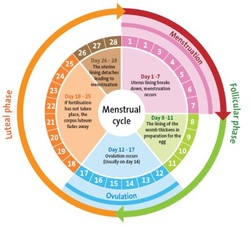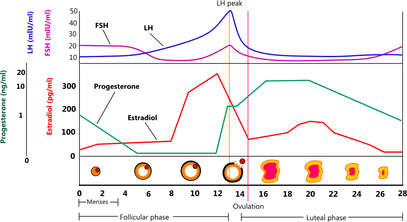
Menstrual period usually lasts for 2-7 days. Moderate flow means that about 7 soaked regular-sized sanitary products were used during these days. Heavy flow means 9 to 12 soaked regular-sized sanitary products, while around 16 means that the flow is very heavy.
Very heavy and prolonged periods, sometimes with passing big clots (menorrhagia) could be also very painful (dysmenorrhea). It happens when estrogen levels are higher and progesterone levels are lower than normal.

Estradiol (17β-estradiol), a steroid and estrogen hormone, is the primary female sex hormone. In the normal menstrual cycle, estradiol levels are lowest (typically <50 pg/ml) at menstruation, rise with follicular development (peaking at about 200 pg/ml a couple of days before ovulation), drop briefly at ovulation, and rise again during the luteal phase for a second peak. At the end of the luteal phase, estradiol levels drop to their menstrual levels unless there is a pregnancy. Other estrogens such as estriol and estrone are significant mostly during pregnancy.
Follicle-stimulating hormone (FSH) stimulates the growth and recruitment of immature ovarian follicles in the ovary. Luteinizing hormone (LH) also called interstitial cell–stimulating hormone (ICSH) acts synergistically with FSH.
Progesterone is highest in the middle of luteal phase and even higher during pregnancy.
